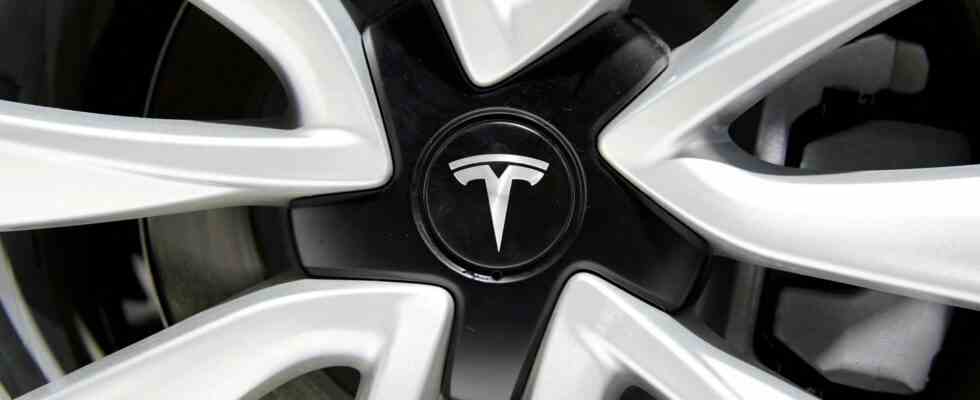Status: 10/18/2022 1:36 p.m
So far this year, Tesla has been the leader in the sale of e-cars in Germany. The US automaker has replaced Volkswagen as the market leader. The car market is slowly recovering across Europe.
The US carmaker Tesla has left Volkswagen behind as the market leader in electric cars in Germany. From January to September, Tesla sold 38,458 cars, while the second-place Volkswagen brand suffered a slump to 32,326 cars, according to the latest statistics released by the Federal Motor Transport Authority (KBA).
Compared to the same period last year, Tesla achieved an increase of 48 percent in the still small but strongly growing segment of pure electric cars. Volkswagen, on the other hand, lost around 40 percent. As in the previous year, the third largest electric car brand was the Korean manufacturer Hyundai with almost 21,000 new vehicles.
Other automakers are slowly catching up
The German premium manufacturers Audi, BMW and Mercedes-Benz as well as Opel increased their e-car sales in their home market, but with quantities between 16,000 and 18,000 they are still far behind Tesla. The VW subsidiary Audi and BMW increased the share of e-cars in domestic sales significantly to 11.8 and 10.6 percent. At Mercedes-Benz, the rate increased to 8.8 percent. The sports car manufacturer Porsche, which only has one pure electric car on offer, sold 2,855 vehicles fewer than in the previous year.
With total sales falling significantly, the proportion of cars with alternative drive systems in Germany rose by eleven percentage points to 45 percent by the end of September. New battery-electric vehicles (BEV) – i.e. cars that are powered exclusively by an electric motor – were in greater demand than plug-in hybrids, in which the electric motor supplements the combustion engine. BEVs accounted for 14.6 percent of all car sales, their share thus increasing by almost a quarter.
European car market is recovering
Across Europe, the car market has largely recovered from the massive supply chain problems; however, manufacturers are preparing for the next crisis. Compared to the previous year, new registrations increased for the second month in a row, as announced by the European manufacturers’ association ACEA. Here, too, registrations of electric cars increased particularly strongly. Overall, however, the sales level is still below the figures before the corona pandemic, and a renewed decline is expected in the medium term due to the economic downturn.
In August, sales of new cars in Europe increased slightly for the first time in 13 months. This trend continued in September: in a year-on-year comparison, ten percent more new cars were registered in the EU countries. Overall, ACEA still expects that the 2022 financial year will be even worse than 2021.
Biggest leap in German new car market
In a country comparison, the new car market in Germany made the biggest jump with a sales increase of 14.1 percent. Spain also recorded a strong increase of 12.7 percent. On the other hand, growth was below average in France (5.5 percent) and Italy (5.4 percent). In the first nine months of the year, new registrations across the EU fell by 9.9 percent year-on-year.
Regardless of the fact that Tesla has left Volkswagen behind in e-car sales in Germany, VW is still the manufacturer with the highest sales in Germany and Europe: According to ACEA, the Wolfsburg-based company recorded strong growth in September, especially with the Skoda, Audi and Porsche brands . In contrast, the European number two, Stellantis, fell behind, especially the brands Jeep, Fiat and Citroën. The Renault group did relatively well thanks to the Dacia brand.
“The delivery situation is improving”
From spring 2021, car manufacturers in Europe and North America had had logistical problems, such as a shortage of semiconductors. Peter Fuss, an expert at the consulting firm EY, now sees at least a temporary Europe-wide recovery. “The lack of chips is decreasing, the delivery situation is improving,” he explained. “This is probably due not least to falling demand in other sectors that have been badly affected by the economic downturn.”
There is still a “comfortable cushion” of orders to process from the past few months, which is why the number of new registrations should continue to rise, explained Fuss. In the medium term, however, “the economic downturn, the energy crisis and inflation” should also make themselves felt on the new car market.
Markets are only growing in China and India
Internationally, among the major automotive markets, only the Chinese and Indian are significantly above the pre-corona level. This year, new registrations in China increased by 15 percent and in India by 23 percent, according to the German Association of the Automotive Industry. In the USA, new registrations fell by 13 percent year-on-year, which is even more than in the EU. Japan recorded a minus of eleven percent – sales there in September were also significantly lower than in the same month last year (minus 26 percent). In Russia, the car market collapsed by 60 percent this year.

